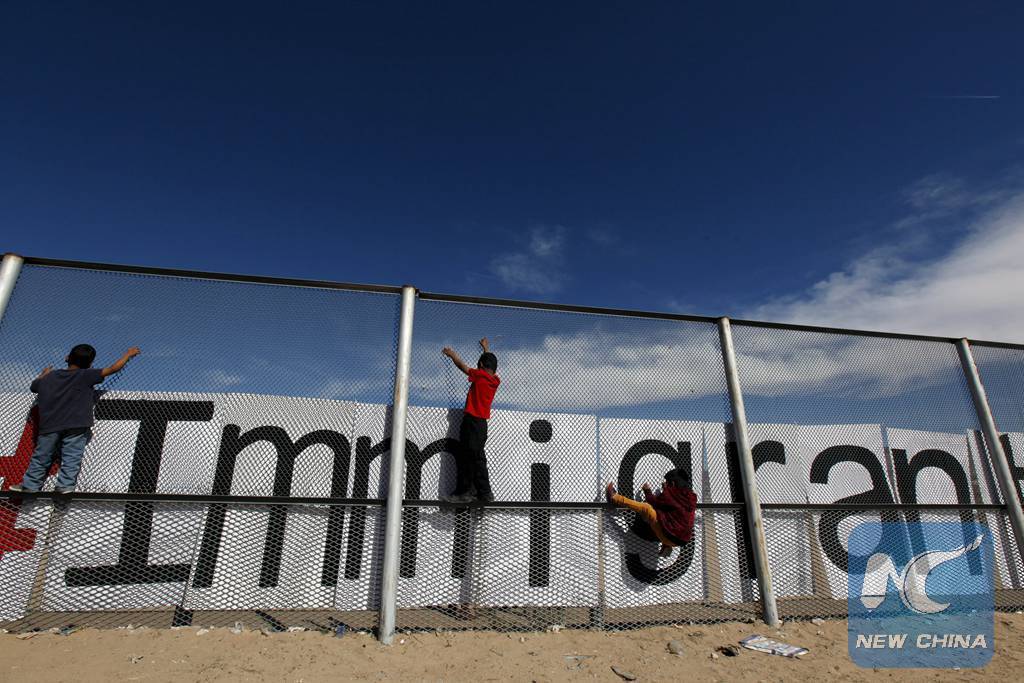
People meet through the border fence between Ciudad Juarez and El Paso, United States, after a bi-national Mass in support of migrants in Ciudad Juarez, Mexico, February 15, 2016. (REUTERS/Jose Luis Gonzalez)
by Luis Brito
MEXICO CITY, Jan. 18 (Xinhua) -- Mexican "Dreamers" -- immigrants in the United States with a potential pathway to citizenship, face an uncertain future given that President-elect Donald Trump may cancel an executive order that has allowed them to stay in America since 2012.
"If this new administration removes this program, it will be like going back to zero, to being afraid of deportation and to lose everything we have built," said Mauro Trejo, a 23-year-old student who lives in New York after moving from Mexico City when he was a child.
The Deferred Action for Childhood Arrivals (DACA), signed by President Barack Obama in June 2012, halts deportation and authorizes thousands of young immigrants to work in a temporary capacity. They soon became known as "Dreamers."
Washington has not released exact figures about the numbers of people who benefit from DACA but the Mexican government believes around 560,000 of its citizens are enrolled. These people entered the United States as children, are usually studying and have not committed serious crimes.
Now, with Trump about to enter the White House, more than half a million youngsters who may have little connection with Mexico are unsure about their future.
During his campaign, the president-elect said he would cancel many of Obama's executive orders concerning immigration, without specifically referring to the Dreamers.
"If DACA is removed, I don't know what to do about my career or my future," Yahaira Morales, a 20-year-old student in Texas from Mexico, told Xinhua. "I think of myself as American even though I have no papers. I cannot imagine my life outside the U.S.."
Mauro, a criminology student in New York, is in the same situation. He works in the City University of New York's (CUNY) office to orient Latino students on educational matters.
"I have colleagues and friends who do not benefit from DACA and I can tell you that having it changes your life. You lose the fear of being deported," he said.

Children climb up the border fence between Ciudad Juarez and El Paso, United States, during a bi-national Mass in support of migrants in Ciudad Juarez, Mexico, February 15, 2016. (REUTERS/Jose Luis Gonzalez)
The interim director of CUNY's Institute of Mexican Studies, Jose Higuera, told Xinhua that Trump needed to make his policy on DACA very clear and end the suspense.
He stated that DACA concerns are affecting the school and work life of the Dreamers, part of the 5.8 million immigrants without papers present in the United States.
"If from the start, he says 'this ends on Jan. 20', we know how to respond to that reality. But he keeps making threats...and than goes back on them," said Higuera.
The president of the College of Mexico, Silvia Giorguli, warned that the potential deportation of Dreamers would leave the country facing the challenge of integrating thousands of young people who are only Mexican by birth.
This would mean authorities would have to improve employment conditions and ensure that society would accept these people back without reservations.
"We would have to change the discourse to say this is not a problem, this is a resource we must take advantage of," she noted.
For Yahaira, her fears about a potential life in Mexico are almost equal to those she has about the cancellation of DACA. "What will be my next steps? What will be my role in the community, in my new community I have never really known," she said.

